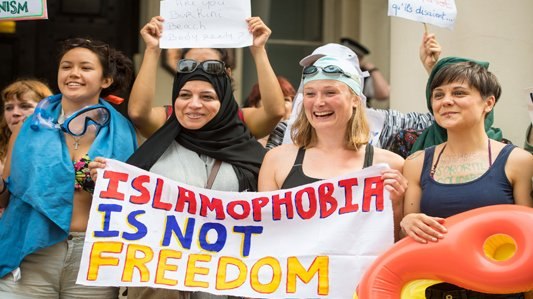With Britain enjoying an uncharacteristically hot and sunny bank holiday weekend, many people will be heading for the beach.
Few, I guess, will be expecting any trouble with the police about what they wear when they get there. But that’s not the case in France. Police are patrolling beaches on the French Riviera and fining Muslim women who are wearing swimwear designed to conceal rather than expose female flesh. The so-called ‘burkinis’ have been banned. Can that be justified? Late on Friday afternoon France’s highest
Twenty-six towns on the south-east coast of France, including Nice and Cannes, have laid down a temporary law for the summer stopping Muslim women from covering themselves completely when they’re swimming or relaxing on the beach. In part the restriction is a response to the terrorist outrage in Nice on Bastille Day, when eighty-six people, watching a firework display on the promenade, were mown down by a truck deliberately driven at speed among them. The driver was Muslim: whether he was acting as a jihadist or as a consequence of severe mental problems remains unclear. But the ban has also been justified as consistent with France’s secularist tradition.
Announcing the ban in Cannes, its mayor said: ‘Access to beaches and for swimming is banned to any person wearing improper clothes that are not respectful of accepted customs and secularism. Beachwear which ostentatiously displays religious affiliation, when France and places of worship are currently the target of terrorist attacks, is liable to create risks of disrupting public order.’
The bans have been challenged in court by human rights groups and campaigners against Islamophobia. But a local court, in Villeneuve-Loubet, upheld the ban, forcing those opposing it to take the case to France’s highest administrative court, the Conseil d’Etat. A ruling was expected at the end of this week.
The series of jihadlist attacks in France over recent years, including at the satirical magazine, Charlie Hebdo, in Paris in January and Nice in July, has undoubtedly raised tensions and fears in France that another atrocity could be just around the corner. The response has been to intensify France’s commitment to secularism, the clear separation between church and state. This makes France very different from Britain, where the head of state, the Queen, is also the supreme governor of the Church of England and swears an oath at the coronation to be a ‘defender of the faith’.
France’s secularism, or ‘läicité’, goes back at least to the Revolution. It was embodied in the constitution of 1905, when all educational institutions were required to be secular. And, with the growing number of Muslim migrants from former French colonies in north Africa, it has increasingly been asserted in restricting aspects of French Muslim behaviour. In 2004 religious emblems were banned in all French schools and colleges and in 2010 France became the first country to ban the full-face veil in public places.
The burkini ban is just the latest example and polls suggest it commands broad public support. A recent poll found that 64% of French people favoured the ban, with 30% ‘indifferent’ to it. France’s simultaneous commitment to ‘liberté’ seems to take second place.
The result has been what to many outsiders will seem the bizarre and even outrageous image of police on the French Riviera, a place that used to enjoy a reputation for decadence and loose-living, patrolling the beaches looking for women wearing too much clothing rather than too little. Those breaching the ban can be fined £33. Images of armed police actually ordering women to remove clothing have offended even some of those who support the ban.
Those who oppose it say it is not just the restriction of freedom they worry about but also the consequences for relations between French Muslims and the rest of the population. The radical French newspaper, Libération, argues that the ban is a gift for Islamic propaganda. And Anouar Kbibech, the president of the French Council of the Muslim Faith, expressed a ‘growing fear of stigmatisation of Muslims in France’.
Inevitably, the controversy has entered the world of French politics, dividing the government. The socialist prime minister, Manuel Valls, has supported the councils imposing the bans, saying that burkinis represent the ‘enslavement of women’. But his education minister, Najat Vallaud-Belkacem, herself a Muslim born in Morocco, said that while she did not herself approve of burkinis, the bans were ‘not welcome’ and that they had ‘let loose’ verbal abuse of Muslim women.
The former president, Nicolas Sarkozy, who has just launched his bid to regain office, backed the ban and proposed further secularisation measures, including banning hijad headscarves in universities. He argued for greater enforcement of assimilation and took a swipe at Britain.
He said: ‘We are not Anglo-Saxons who allow communities to live side by side while ignoring one another. It is time to engage in a determined combat against multiculturalism.’ He said immigrants and those born to immigrants must assimilate ‘not just with nationality but also with values, culture and way of life’.
The debate has engaged many people in this country too. How much should those of a different culture conform to the dominant culture of a society and how far should that dominant culture impose restrictions on the way immigrants from a different culture lead their lives. In Britain it does not involve police telling women on beaches to take their clothes off. Perhaps that is simply because Britain has been fortunate in not suffering Islamic terrorism on the scale of France. Or it may be because we have a less militant attitude to secularism.
Nonetheless, the question of whether Muslim dress is provocative and even a threat to public order in Britain cannot wholly be dismissed as not our problem. A young Muslim woman told the Today programme that after the Nice attack she was pushed and shoved at Victoria station in London by a racist who blamed her for the outrage. She was wearing a headscarf at the time. She has not taken public transport since and she has stopped wearing her headscarf. She has had no further trouble. This example could be seen as making the case for banning certain forms of Islamic dress in the interests of public order. But it could also be regarded as giving in to racism.
Our ability to take a more relaxed view than France is perhaps best expressed by the Times leader-writer: ‘Mr Sarkozy should perhaps take tea with Nadiya Hussain, Britain’s champion baker, and marvel at how neither her hijab nor strawberry éclairs have turned her into a threat to national security’.
What’s your attitude to the burkini ban? Do you think Britain should take a tougher line on what Muslim women wear here or not? And do you think France’s commitment to secularism is a good thing and one which Britain should emulate?









